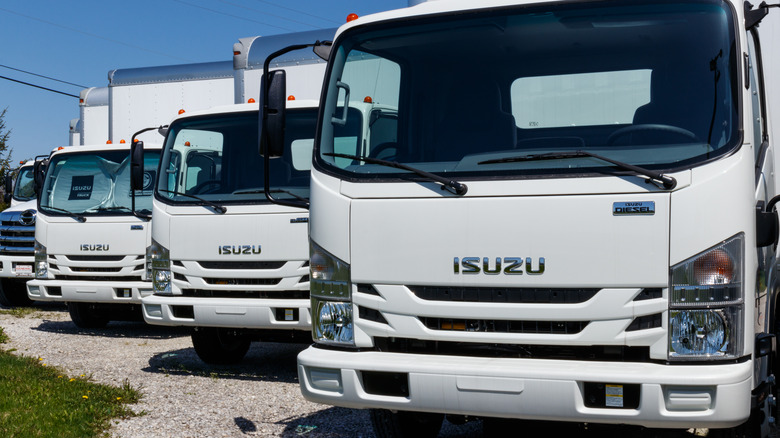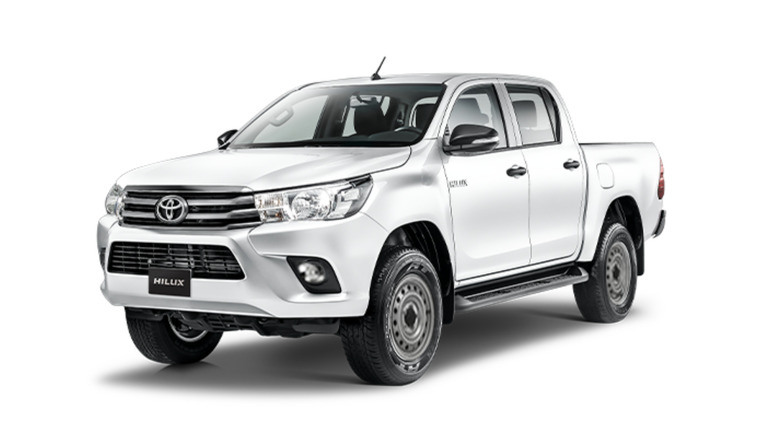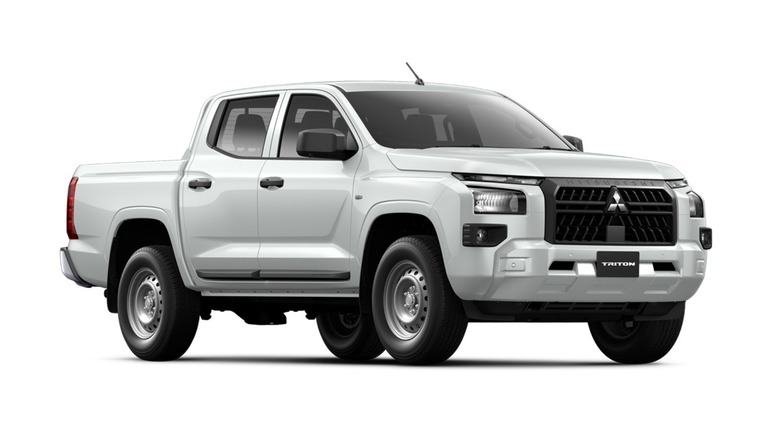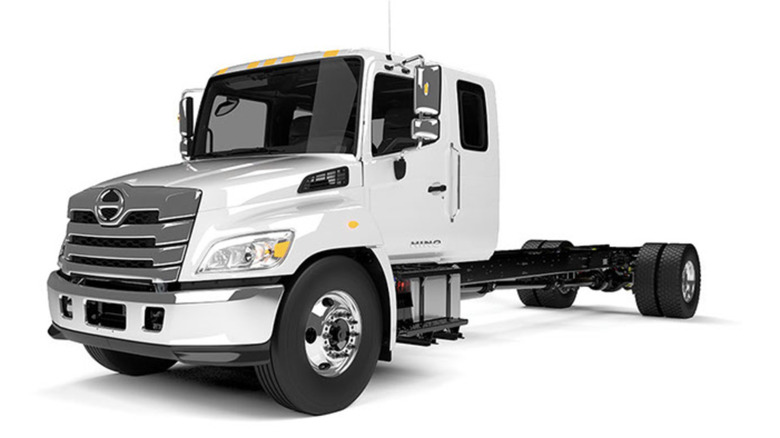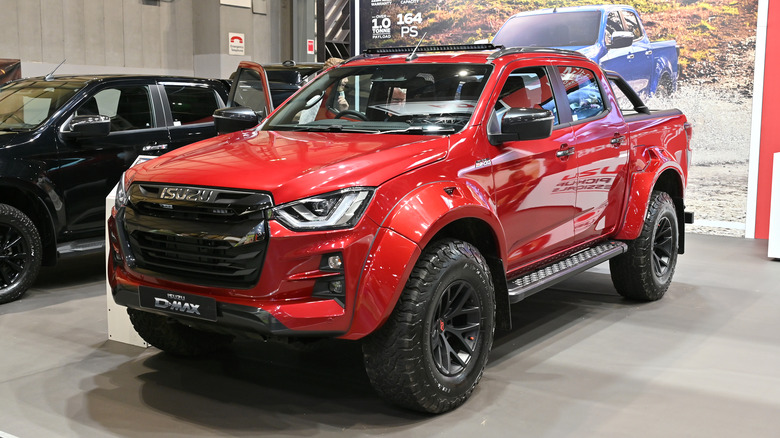4 Japanese Auto Manufacturers That Still Use Diesel Engines
Diesel engines are most often associated with commercial big rigs and large, work-oriented pickup trucks. This reputation was earned in part by the performance of motors like the Chevy Duramax 6.6-liter powerhouse and Ford's Powerstroke 7.3-liter V8. Diesel engines are good for heavy-duty vehicles due to their high torque output, long operating life, and low maintenance costs. Diesel fuel also stores more energy than gasoline, making diesel engines more efficient than their gas counterparts, although they tend to have less pep. To close this performance gap, manufacturers have begun deploying turbochargers in most diesel engines.
Diesel engines in passenger cars took a public relations hit with Volkswagen's 2010 Dieselgate scandal, and VW abandoned diesel motors in the U.S. in 2016 to focus on manufacturing EVs. Japanese automakers are more commonly associated with fuel-efficient gasoline engines like Nissan's 2.0 liter turbocharged SR20DET or high-output motors including Honda's most powerful. In the past few years, Honda and Suzuki have largely stopped making diesel-fueled cars and trucks, and Nissan announced they will phase out diesel production by next year. Fans of Japanese-made vehicles need not panic just yet. A few familiar manufacturers from the island nation still make diesel-powered trucks.
Toyota
Last year, Toyota ranked as the world's top-selling automaker with more than 11 million vehicles sold. Three of the eight best-selling models worldwide were Toyotas, including the Hilux pickup, which accounted for more than half a million units sold. The model was displaced by the Tacoma in the United States in 1995, but buyers in Mexico, Japan, and Africa can get one of Toyota's legendary Hilux trucks with a diesel engine. African customers can also get a Land Cruiser Series 70 with a diesel powerplant, and Australian Toyota buyers have their choice of three diesel-powered SUVs: the Land Cruiser 300, the Prado, or the Fortuner.
American buyers aren't just shut out of driving a Hilux. A statement on Toyota's website notes, "Toyota has no plans to introduce a diesel-powered vehicle in the United States in the near future," and cites emissions laws before adding the qualifier, "We are, however, aware of consumer interest in a diesel-powered vehicle and will continue to evaluate this option."
Mitsubishi
The Hilux isn't the only diesel truck unavailable in the USA. Although the Mitsubishi Triton is currently only for sale in Asia and Australia, Mitsubishi's North American Product Planning Director Cason Grover told The Drive his company was considering bringing the Triton to the United States. "It's another one of those things we want to try to figure out. We'd love to be able to do it." Grover didn't mention whether a U.S. market Triton would have a diesel option, but stateside RV and boat owners will have their fingers crossed.
In the meantime, U.S. buyers will have to settle for non-truck options if they prefer a Mitsubishi vehicle. The company stopped importing trucks to the U.S. in 2009, to focus on smaller and cheaper vehicles for the market. The company announced last year, however, that it is considering bringing a mid-size truck back, though finalized plans have not been announced.
Hino
You don't have to travel overseas to buy a Hino truck, but you probably won't be able to fit one in your garage. Hino is a commercial truck maker that came under the Toyota umbrella in 2001 and makes large commercial trucks powered by Cummins diesel engines. Hino's L series trucks get the Cummins B series 6.7-liter turbodiesel that makes up to 260 horsepower and 660 pound-feet of torque, and the XL series gets an 8.9-liter Cummins I6 capable of as much as 360 horsepower and 1,150 pound-feet of torque.
Hino trucks aren't all bulk and brawn, though. They come with roomy, feature-laden cabs that include Bluetooth audio and phone connectivity with steering wheel controls, an LCD instrument display, air conditioning, and cruise control. Both Hino lines also have advanced safety features like active collision avoidance and lane departure warning systems, as well as electronic stability control. For commercial usage, the Hino Edge network helps dispatchers monitor fleet performance and efficiency remotely.
Isuzu
Isuzu doesn't only make diesel-powered commercial trucks like the ones often seen on highways. Asian market customers can drive home a D-Max pickup or MU-X PPV (Pickup Passenger Vehicle), an SUV based on the D-Max. The platform is also used for the Traga, a flatbed sold in Indonesia for commercial use. The standard engine in the D-Max and MU-X is a 1.9-liter turbodiesel that produces about 161 horsepower and 265.5 pound-feet of torque.
Isuzu stopped selling passenger vehicles in the United States in 2009, but still offers a broad range of commercial trucks powered by gasoline, diesel, and electric motors to American buyers. Isuzu's N Series diesel trucks come with four-cylinder turbodiesel engines as big as 5.2 liters and producing 215 horsepower and 452 pound-feet of torque, and the beefier F series can be had with the same 6.7 liter Cummins B engine that Hino uses in its L series of trucks.
